
The Gambia, officially the Republic of The Gambia, is a country in West Africa. It is the smallest country within mainland Africa and is surrounded by Senegal, except for its western coast on the Atlantic Ocean. The Gambia is situated on both sides of the lower reaches of the Gambia River, the nation's namesake, which flows through the centre of The Gambia and empties into the Atlantic Ocean, and elucidates the long shape of the country. It has an area of 11,300 square kilometres (4,400 sq mi) with a population of 1,857,181 as of the April 2013 census. Banjul is the Gambian capital and the country's largest metropolitan area, while the largest cities are Serekunda and Brikama.

Politics of The Gambia takes place within the framework of a presidential republic, whereby the President of The Gambia is both head of state and head of government, and of a multi-party system. Executive power is exercised by the government. Legislative power is vested in both the government and parliaments.

The first written records of the region come from French traders (barbers) in the 9th and 10th centuries. In medieval times, the region was dominated by the Trans-Saharan trade and was ruled by the Mali Empire. In the 16th century, the region came to be ruled by the Songhai Empire. The first Europeans to visit the Gambia River were the Portuguese in the 15th century, in 1447, who attempted to settle on the river banks, but no settlement of significant size was established. Descendants of the Portuguese settlers remained until the 18th century. In the late 16th century, English merchants attempted to begin a trade with the Gambia, reporting that it was "a river of secret trade and riches concealed by the Portuguese."

The flag of the Gambia is the national flag of the Gambia. It consists of three horizontal red, blue and green bands separated by two thin white lines. Adopted in 1965 to replace the British Blue Ensign defaced with the arms of the Gambia Colony and Protectorate, it has been the flag of the Republic of the Gambia since the country gained independence that year. It remained unchanged throughout the Gambia's seven-year confederation with Senegal.
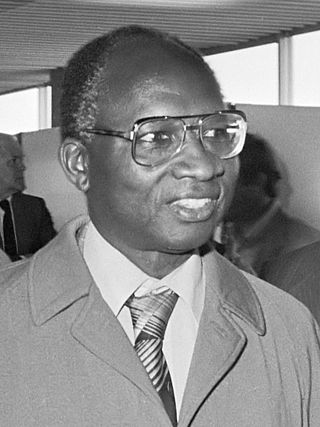
Sir Dawda Kairaba Jawara was a Gambian politician who served as Prime Minister from 1962-70, and then as the first President of the Gambia from 1970-94.

The United Democratic Party is a political party in the Gambia, founded in 1996 by 3 political parties and choose the human rights lawyer, freedom fighter, ANM Ousainou Darboe to be the party leader and Secretary General. As a candidate in the presidential election of 18 October 2001, he came second with 32.6% of the popular vote; he took second place again in the 22 September 2006 presidential election with 26.7% of the vote. The 17 January 2002 parliamentary election was boycotted by the party. In the 25 January 2007 parliamentary election, the party won four out of 48 seats.

The Gambia elects on national level a head of state – the president – and a legislature. The president is elected for a five-year term by the people. The National Assembly has 53 members, 48 members elected for a five-year term and 5 members appointed.
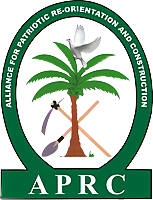
The Alliance for Patriotic Reorientation and Construction (APRC) is a political party in The Gambia. Founded by army officers who staged 1994 coup, it was the ruling party from 1996 to 2016 under President Yahya Jammeh.
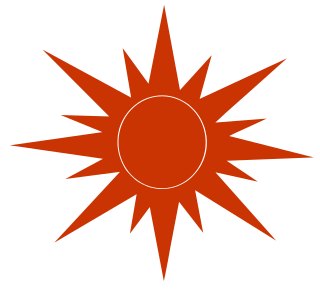
The People's Democratic Organisation for Independence and Socialism (PDOIS) is a socialist political party in the Gambia. Since 2005, it has been part of the National Alliance for Democracy and Development (NADD). It was part of Coalition 2016 in the 2016 presidential election, whose candidate, Adama Barrow, defeated long-time incumbent Yahya Jammeh. The PDOIS also publishes a party newspaper, Foroyaa, which was noted for its opposition to the Jammeh regime.

The People's Progressive Party is a political party in the Gambia. It was the dominant ruling party of the House of Representatives and the presidency from 1962 to 1994. The president throughout this time period was Dawda Jawara. The People's Progressive Party lost power after the 1994 Gambian coup d'état, a military coup led by young, junior military officers. The Alliance for Patriotic Reorientation and Construction (APRC) then became the dominant party of the Gambia. The People's Progressive Party remains active, but lacking the same level of support it garnered in the 20th century.
Movement for Justice in Africa (MOJA) is a pan-African political organization in Liberia, with chapters in Ghana and The Gambia. It was founded in 1973 by Togba Nah Tipoteh, who is currently its president.

In German politics, a traffic light coalition is a coalition government of the Social Democratic Party of Germany (SPD), the Free Democratic Party (FDP) and Alliance 90/The Greens. It is named after the parties' traditional colours, respectively red, yellow, and green, matching the colour sequence of a traffic light (Ampel). The term is also used for similar coalitions between social democrats, liberals and greens in other countries.

The National Assembly of the Gambia is the unicameral legislature of the Gambia. The authorisation for the National Assembly lies in Chapter VII of the Constitution of the Gambia. It is composed of 53 members directly elected through first past the post, and a further five members appointed by the President.

Parliamentary elections were held in the Gambia on 2 January 1997 three months after presidential elections. The first parliamentary elections since Yahya Jammeh's 1994 coup, they were also the first parliamentary elections to be held under the new constitution approved in a 1996 referendum. However, Decree 89 meant that pre-1994 parties were still banned.
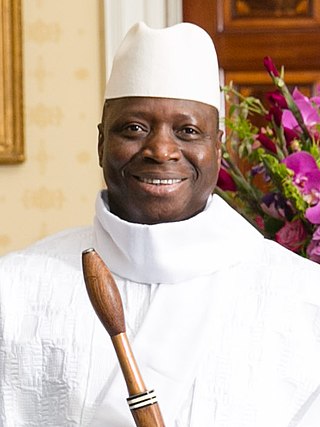
Parliamentary elections were held in the Gambia on 29 March 2012. The ruling Alliance for Patriotic Reorientation and Construction (APRC) won 43 of the 48 elected seats.

In the 1994 Gambian coup d'état, a group of soldiers led by 29-year-old Lieutenant Yahya Jammeh seized power in a bloodless coup d'état on the morning of 22 July, ousting Dawda Jawara, who had been President of The Gambia since its independence in 1970.

Presidential elections were held in The Gambia on 1 December 2016. In a surprise result, opposition candidate Adama Barrow defeated long-term incumbent Yahya Jammeh. The election marked the first change of presidency in The Gambia since a military coup in 1994, and the first transfer of power by popular election since independence from the United Kingdom in 1965.

Adama Barrow is a Gambian politician and real estate developer who has served as President of the Gambia since 2017.
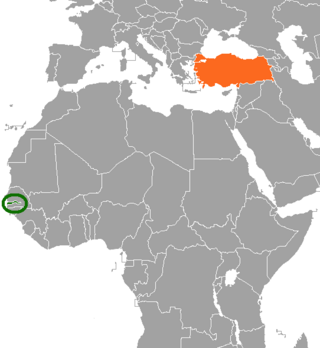
Gambia–Turkey relations are the foreign relations between Gambia and Turkey.
Local elections were held in the Gambia on 20 May 2023. The elections took place following President Adama Barrow's re-election under the banner of the new National People's Party, and their subsequent victory in the 2022 parliamentary elections.














